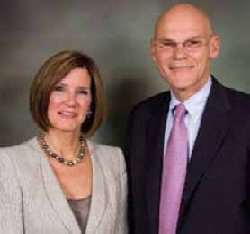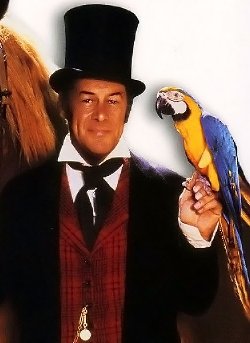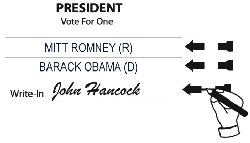- Good question and something that has puzzled us from time immemorial.
 On a recent trip to work one morning I was tuned into a local radio talk show. One of the DJ's mentioned he happened to be married to a vegan, yet he was a confirmed meat eater. The other two DJ's sharing the microphone with him found this amusing, as did I, and they asked him what life was like living with a vegan, particularly at dinner time. Somehow they found a way to avoid squabbles and respect each other's culinary preferences. One didn't intrude on the other, and they have lived happily together for quite some time.
On a recent trip to work one morning I was tuned into a local radio talk show. One of the DJ's mentioned he happened to be married to a vegan, yet he was a confirmed meat eater. The other two DJ's sharing the microphone with him found this amusing, as did I, and they asked him what life was like living with a vegan, particularly at dinner time. Somehow they found a way to avoid squabbles and respect each other's culinary preferences. One didn't intrude on the other, and they have lived happily together for quite some time.
I am always intrigued by couples who appear to be incompatible on the surface, yet somehow find a way to build a successful marriage. I have seen tall people marry short people, fat and thin, wild versus mild, mixed religions, mixed races, and mixed politics. As to the latter, there is probably no better example than political pundits James Carville (Democrat) and Mary Matalin (Republican) who were married in 1993 and have two daughters. Even though they worked on opposing political campaigns, they somehow found the right chemistry to make their marriage work. This particular union has puzzled people for years, particularly due to their different personalities. When they appear on television, Carville is very animated and chatty, and Matalin appears more sedate and thoughtful. Both have strong personalities in their own right. When they appear on television together, they make it clear they do not agree on several political issues and try to correct each other, which can be rather amusing to watch. As I understand it though, politics is a taboo subject at home, particularly around their children. As an aside, I wonder if this political odd couple votes at election time since they will undoubtedly cancel each other out.
Then there are the law-abiding citizens who marry convicts while incarcerated. I never did quite understand this; a spouse who is free on the outside and a convicted criminal on the inside, never having physical contact or living together. Even people committing some of the most heinous crimes seem to score well from within the walls of prison. Maybe there is sex appeal in the forbidden fruit of a mass murderer, or maybe they're just plain nuts. Somehow I have a hard time grasping death row as a lover's lane.
How the opposite ends of a magnet are attracted is easier to explain than human compatibility. Scientists have a lot of theories for the attraction of people, but no conclusive facts. There are those who believe it is based on a biological and chemical arousal whereby people are attracted by scent which somehow matches the female's hormonal status. This would suggest it's all in the DNA. Then there are those who believe it is based on complementary psychological makeups, or maybe based on some astrological compatibility where the stars must be in some specific alignment.
As for me, I don't buy any of this. Frankly, I'm not sure what it is that makes another person float your boat. Maybe it's physical, maybe it's logical. I tend to believe there is some specific element of the other person we find intriguing, and realizing they are complete opposites, we tend to work harder at building and maintaining a relationship than those people who are much more compatible. Keep in mind, there has to be more "give and take" in a marriage of opposites as opposed to those who are evenly matched. They have to work harder if they want to sustain it. A relationship of opposites will be obviously more challenging than a compatible relationship which will likely be more sedate. I guess some people thrive on a challenge, and some do not.
Maybe the only way this can be proven is by studying the duration of marriages and divorce rates of compatible couples versus polar opposites. Wouldn't it be interesting if the opposite couples were more successful? Keep in mind, Carville and Matalin have now been married for 19 years, and it certainly couldn't be due to their politics. In 2009, the two were interviewed by CNN's John King who asked them how to maintain a happy marriage:
Carville: "I don't have a position on anything domestically. So I just say yes, and then go on and do it. I mean it. I would say the three ingredients to successful marriage is surrender, capitulation and retreat."
Matalin: "Spoken like a true liberal. What a martyr. Faith, family and good wine. That's how we do it."
Keep the Faith!
Note: All trademarks both marked and unmarked belong to their respective companies.
 Tim Bryce is a writer and the Managing Director of M&JB Investment Company (M&JB) of Palm Harbor, Florida and has over 30 years of experience in the management consulting field. He can be reached at timb001@phmainstreet.com
Tim Bryce is a writer and the Managing Director of M&JB Investment Company (M&JB) of Palm Harbor, Florida and has over 30 years of experience in the management consulting field. He can be reached at timb001@phmainstreet.com
For Tim's columns, see:
timbryce.com
Like the article? TELL A FRIEND.
Copyright © 2012 by Tim Bryce. All rights reserved.
Listen to Tim on WJTN-AM (News Talk 1240) "The Town Square" with host John Siggins (Mondays, Wednesdays, Fridays, (12:30-3:00pm).
 Preface: An entertaining bedtime story providing some fundamental lessons of life for your children, such as work ethic, honesty, responsibility, and simple business principles. Ages recommended: 6-10.
Preface: An entertaining bedtime story providing some fundamental lessons of life for your children, such as work ethic, honesty, responsibility, and simple business principles. Ages recommended: 6-10. I recently discussed the four basic types of personalities;
I recently discussed the four basic types of personalities;  Have you ever noticed how people tend to be kinder and more understanding to their pets as opposed to the people around them, be it family, friends, coworkers, shopkeepers, or whoever? The contrast is startling. Whereas some people bristle at others, pets have become their pride and joy. So much so, people have no problem paying hundreds or thousands of dollars for dogs and cats. Years ago you could pick up a pet for as little as $20, with papers. Now, not only do people shell out big bucks for pets but lavish them with expensive food and toys, not to mention grooming and health issues which can also cost hundreds of dollars. Their teeth are now brushed, their nails painted, and hair carefully coiffed. Frankly, nothing is too good for them. It's a bit disturbing though, when the pet receives more attention than the people surrounding the owner.
Have you ever noticed how people tend to be kinder and more understanding to their pets as opposed to the people around them, be it family, friends, coworkers, shopkeepers, or whoever? The contrast is startling. Whereas some people bristle at others, pets have become their pride and joy. So much so, people have no problem paying hundreds or thousands of dollars for dogs and cats. Years ago you could pick up a pet for as little as $20, with papers. Now, not only do people shell out big bucks for pets but lavish them with expensive food and toys, not to mention grooming and health issues which can also cost hundreds of dollars. Their teeth are now brushed, their nails painted, and hair carefully coiffed. Frankly, nothing is too good for them. It's a bit disturbing though, when the pet receives more attention than the people surrounding the owner.
 Vice President Joe Biden has become the poster child for flubs and gaffes. Quite often the President has had to take action for something his VP has said and spin it to make it more palatable to the public. In a way, Mr. Biden reminds me of the Michael Scott character on NBC's "The Office" whereby he speaks to the camera to make some sort of witticism which is either baffling or just plain embarrassing. The Vice President's blunders are well documented in both print and video. On
Vice President Joe Biden has become the poster child for flubs and gaffes. Quite often the President has had to take action for something his VP has said and spin it to make it more palatable to the public. In a way, Mr. Biden reminds me of the Michael Scott character on NBC's "The Office" whereby he speaks to the camera to make some sort of witticism which is either baffling or just plain embarrassing. The Vice President's blunders are well documented in both print and video. On  The subject of "corporate culture" seems to be on everyone's mind these days; from the college graduate entering the job market, to the executive who is trying to improve management and productivity in his organization. It is the topic of interest at social and professional gatherings.
The subject of "corporate culture" seems to be on everyone's mind these days; from the college graduate entering the job market, to the executive who is trying to improve management and productivity in his organization. It is the topic of interest at social and professional gatherings.
 There's not too much to laugh about these days; unemployment is still high, our economy is still in shambles, and the media has the general populace whipped into a frenzy over the elections in the Fall. In fact, the general disposition of the country is rather depressing, which is why it is refreshing to see or hear something that lifts our spirits, something a little silly. As for me, not long ago I was waiting in line at my bank's drive-in window when a man drove up on a red motorcycle whom I judged to be in his sixties. This was no ordinary motorcycle as it had an attached sidecar with a golden retriever proudly perched inside wearing goggles and a red bandana. It appeared the dog was enjoying himself immensely and didn't seem encumbered by the attire his owner had dressed him in. The sight of the dog stopped everyone in their tracks, both in and outside of the bank. The bank tellers called their colleagues to the window to see him, and the other patrons waiting in line rolled down their window to get a better look. He was simply a very cool pooch who seemed to enjoy the attention, as did his master.
There's not too much to laugh about these days; unemployment is still high, our economy is still in shambles, and the media has the general populace whipped into a frenzy over the elections in the Fall. In fact, the general disposition of the country is rather depressing, which is why it is refreshing to see or hear something that lifts our spirits, something a little silly. As for me, not long ago I was waiting in line at my bank's drive-in window when a man drove up on a red motorcycle whom I judged to be in his sixties. This was no ordinary motorcycle as it had an attached sidecar with a golden retriever proudly perched inside wearing goggles and a red bandana. It appeared the dog was enjoying himself immensely and didn't seem encumbered by the attire his owner had dressed him in. The sight of the dog stopped everyone in their tracks, both in and outside of the bank. The bank tellers called their colleagues to the window to see him, and the other patrons waiting in line rolled down their window to get a better look. He was simply a very cool pooch who seemed to enjoy the attention, as did his master.
 For many years, the American Dream was characterized as "the land of freedom and opportunity," where a person could move about untethered and not be beholden to anyone, particularly the government. People were free to try their hand at anything if they were so inclined, thereby encouraging an entrepreneurial spirit. They also realized they had a say in how government was run, unlike several other countries, thereby encouraging citizenship and patriotism. The general belief was that if you worked hard, you could enjoy the fruits of your labor. I personally know this was the case with my grandfather who immigrated to America following World War I. It was his desire to have a better life and work environment than what he was leaving behind in Great Britain. To him, America was big, opportunities were plentiful, and the sky seemed the limit. After finding work in this country, he moved and settled his family, blended into the community, and never looked back. It was an arduous process to go through, but he was proud to become an American citizen, something millions of other immigrants were proud to do. They were all willing to work hard and sacrifice in order to realize the "Dream."
For many years, the American Dream was characterized as "the land of freedom and opportunity," where a person could move about untethered and not be beholden to anyone, particularly the government. People were free to try their hand at anything if they were so inclined, thereby encouraging an entrepreneurial spirit. They also realized they had a say in how government was run, unlike several other countries, thereby encouraging citizenship and patriotism. The general belief was that if you worked hard, you could enjoy the fruits of your labor. I personally know this was the case with my grandfather who immigrated to America following World War I. It was his desire to have a better life and work environment than what he was leaving behind in Great Britain. To him, America was big, opportunities were plentiful, and the sky seemed the limit. After finding work in this country, he moved and settled his family, blended into the community, and never looked back. It was an arduous process to go through, but he was proud to become an American citizen, something millions of other immigrants were proud to do. They were all willing to work hard and sacrifice in order to realize the "Dream."
 I have always admired the work of the carpenter. To watch a craftsman at work creating something is a delight. During High School I took a couple of wood shop classes which taught me the basics and gave me an appreciation for the skills required to create a wooden object of any merit. I have watched carpenters build houses, create impressive bookshelves and office libraries, carve baseball bats with lathes, and much more. Their attention to detail and ability to produce a quality product is truly inspiring, at least to me. In all cases though, they depend on a good set of plans or blueprints specifying the dimensions and materials to be used. Without them, the carpenter is lost. Even if they were to pursue their labor without such documentation, they would likely produce something that might be of interest to themselves personally, but useless for everyone else. This is why the architect or engineer is needed; to design and specify the product so the carpenter can work effectively. Whereas the carpenter works in the physical world, the architect works in the logical world where his/her ideas and designs are recorded on paper or in the computer.
I have always admired the work of the carpenter. To watch a craftsman at work creating something is a delight. During High School I took a couple of wood shop classes which taught me the basics and gave me an appreciation for the skills required to create a wooden object of any merit. I have watched carpenters build houses, create impressive bookshelves and office libraries, carve baseball bats with lathes, and much more. Their attention to detail and ability to produce a quality product is truly inspiring, at least to me. In all cases though, they depend on a good set of plans or blueprints specifying the dimensions and materials to be used. Without them, the carpenter is lost. Even if they were to pursue their labor without such documentation, they would likely produce something that might be of interest to themselves personally, but useless for everyone else. This is why the architect or engineer is needed; to design and specify the product so the carpenter can work effectively. Whereas the carpenter works in the physical world, the architect works in the logical world where his/her ideas and designs are recorded on paper or in the computer.

